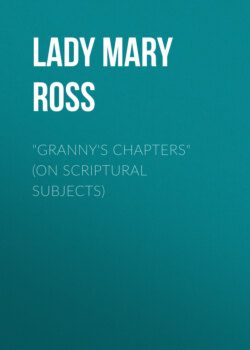Читать книгу "Granny's Chapters" (on scriptural subjects) - Lady Mary Ross - Страница 7
На сайте Литреса книга снята с продажи.
Chapter IV.—THE INNOCENTS.
ОглавлениеTable of Contents
Herod anxiously expected the return of the wise men, with full information as to where he might find the infant King of the Jews: but, as day after day passed and they came not, he saw that they did not mean to do his bidding. "Then was Herod exceeding wroth, and sent forth his soldiers, and slew all the children that were in Bethlehem, and in all the coasts thereof,"—that is, in the neighbouring parts of the country,—"from two years old and under, according to the time which he had diligently enquired of the wise men." As much less than two years had passed, since the wise men saw the star which heralded the birth of the Messiah, Herod made sure that, by killing all the little boys under that age, he should destroy the infant King of the Jews, and so rid himself of any further anxiety.
Terrible was the distress and mourning amongst the poor Mothers, who saw their infants torn from their arms and murdered! but their dear babes were safe; taken from the dangers and troubles of this world, to be for ever happy in the presence of God: "for they are without fault before the throne of God."
Our Church sets apart three days, immediately after Christmas Day, in remembrance of three classes of Martyrs. A Martyr is one who suffers in the cause of duty, and will die rather than give way: those who thus suffered for Christ, and would die rather than offend or forsake Him, are called Martyrs. "The Innocents," as the murdered babes of Bethlehem are called, suffered death for Jesus's sake; but, of course, they had no will in the matter; they were too young: these were the first Martyrs.
The day after Christmas Day is called "St. John the Evangelist's Day": St. John was, when Jesus grew up, one of His disciples: he dearly loved his Master, and was ready to die for Him, but he was not called upon to give up his life, though he suffered much for Jesus's sake. The day following "St. John's Day," is called "St. Stephen's Day": St. Stephen was the first who willingly gave up his life for the sake of Jesus Christ. Thus we have three classes of Martyrs commemorated in our Church: Martyrs in Deed only—the Innocents; Martyrs in Will only—St. John; Martyrs in Will and in Deed—St. Stephen.
But to return to our history. Herod was guilty of a great sin; and, in spite of all his wickedness, the Child Jesus lived and was safe.
It is said that Antipater, who had caused the death of Mariamne's sons, advised his father to slay the infants of Bethlehem. Antipater was a bad man, and, as he was very anxious to be King of Judæa whenever Herod should die, he wished to destroy one who might, as he feared, dispute the kingdom with him: no doubt he rejoiced when the cruel deed was done, concluding that Jesus had perished, and that he was now sure of the throne: but he was disappointed; for very shortly afterwards he in some way displeased his father, who at once caused him to be put to death. It is dreadful to think of the numbers of persons killed by Herod's orders, but Antipater was the last; for five days afterwards Herod himself died.
This Herod, called Herod the Great, left four sons living—Archelaus, Herod Antipas, Philip, and Herod Philip. There are three other Herods also mentioned in Scripture—Herod Agrippa, and his brother, also called Herod, who were sons of Aristobulus, and consequently grandsons of Herod the Great; and, afterwards, a son of Herod Agrippa, called by the same names as his father, Herod Agrippa. As it is difficult always to know which Herod is spoken of, the Table below will be useful to refer to.
